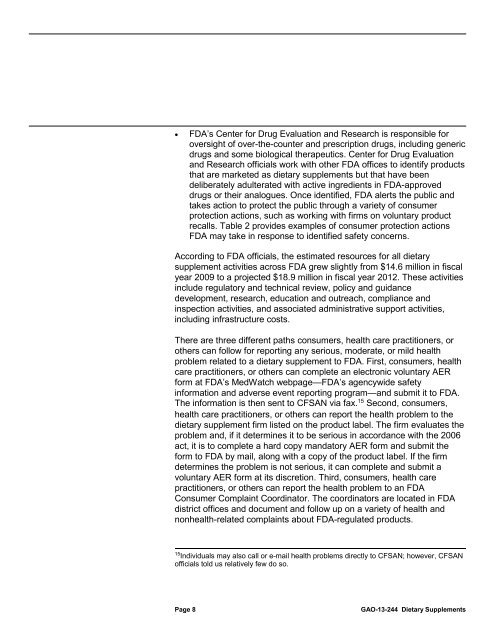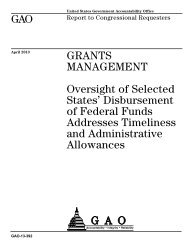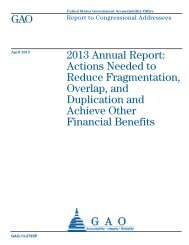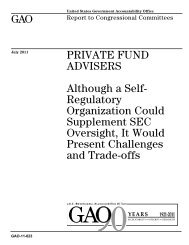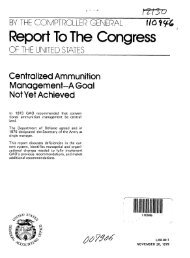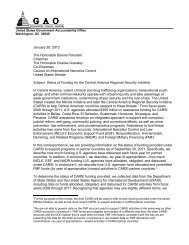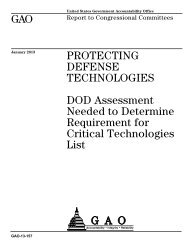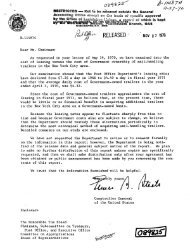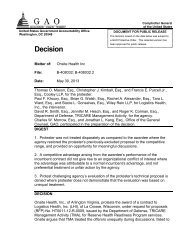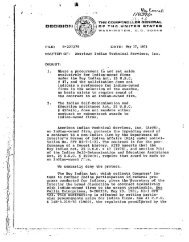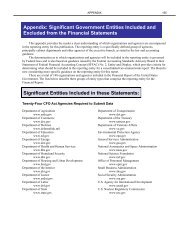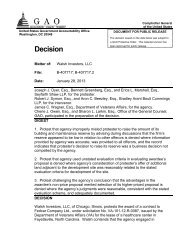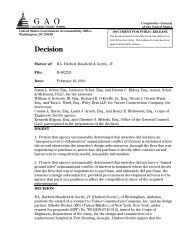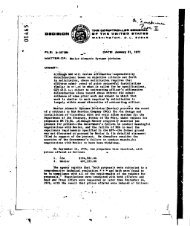Dietary supplements: FDA may have opportunities to expand its use
Dietary supplements: FDA may have opportunities to expand its use
Dietary supplements: FDA may have opportunities to expand its use
Create successful ePaper yourself
Turn your PDF publications into a flip-book with our unique Google optimized e-Paper software.
• <strong>FDA</strong>’s Center for Drug Evaluation and Research is responsible for<br />
oversight of over-the-counter and prescription drugs, including generic<br />
drugs and some biological therapeutics. Center for Drug Evaluation<br />
and Research officials work with other <strong>FDA</strong> offices <strong>to</strong> identify products<br />
that are marketed as dietary <strong>supplements</strong> but that <strong>have</strong> been<br />
deliberately adulterated with active ingredients in <strong>FDA</strong>-approved<br />
drugs or their analogues. Once identified, <strong>FDA</strong> alerts the public and<br />
takes action <strong>to</strong> protect the public through a variety of consumer<br />
protection actions, such as working with firms on voluntary product<br />
recalls. Table 2 provides examples of consumer protection actions<br />
<strong>FDA</strong> <strong>may</strong> take in response <strong>to</strong> identified safety concerns.<br />
According <strong>to</strong> <strong>FDA</strong> officials, the estimated resources for all dietary<br />
supplement activities across <strong>FDA</strong> grew slightly from $14.6 million in fiscal<br />
year 2009 <strong>to</strong> a projected $18.9 million in fiscal year 2012. These activities<br />
include regula<strong>to</strong>ry and technical review, policy and guidance<br />
development, research, education and outreach, compliance and<br />
inspection activities, and associated administrative support activities,<br />
including infrastructure costs.<br />
There are three different paths consumers, health care practitioners, or<br />
others can follow for reporting any serious, moderate, or mild health<br />
problem related <strong>to</strong> a dietary supplement <strong>to</strong> <strong>FDA</strong>. First, consumers, health<br />
care practitioners, or others can complete an electronic voluntary AER<br />
form at <strong>FDA</strong>’s MedWatch webpage—<strong>FDA</strong>’s agencywide safety<br />
information and adverse event reporting program—and submit it <strong>to</strong> <strong>FDA</strong>.<br />
The information is then sent <strong>to</strong> CFSAN via fax. 15 Second, consumers,<br />
health care practitioners, or others can report the health problem <strong>to</strong> the<br />
dietary supplement firm listed on the product label. The firm evaluates the<br />
problem and, if it determines it <strong>to</strong> be serious in accordance with the 2006<br />
act, it is <strong>to</strong> complete a hard copy manda<strong>to</strong>ry AER form and submit the<br />
form <strong>to</strong> <strong>FDA</strong> by mail, along with a copy of the product label. If the firm<br />
determines the problem is not serious, it can complete and submit a<br />
voluntary AER form at <strong>its</strong> discretion. Third, consumers, health care<br />
practitioners, or others can report the health problem <strong>to</strong> an <strong>FDA</strong><br />
Consumer Complaint Coordina<strong>to</strong>r. The coordina<strong>to</strong>rs are located in <strong>FDA</strong><br />
district offices and document and follow up on a variety of health and<br />
nonhealth-related complaints about <strong>FDA</strong>-regulated products.<br />
15 Individuals <strong>may</strong> also call or e-mail health problems directly <strong>to</strong> CFSAN; however, CFSAN<br />
officials <strong>to</strong>ld us relatively few do so.<br />
Page 8<br />
GAO-13-244 <strong>Dietary</strong> Supplements


